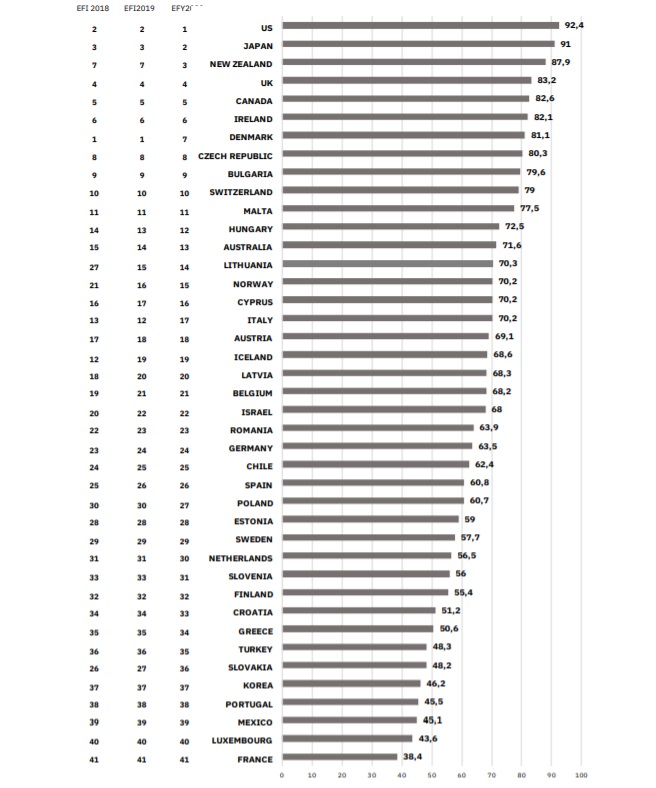Analytics, Estonia, EU – Baltic States, Labour-market, Rating
International Internet Magazine. Baltic States news & analytics
Friday, 19.12.2025, 19:06
Survey: Estonia's employment flexibility has been lowest in Baltics for years
 Print version
Print versionAnnika Kaabel, researcher at Estonian Business School (EBS), said in a press release on Tuesday that the employment flexibility index is used to gauge the balance between the efficiency of the labor market and the rights of employees.
"For the 2020 employment flexibility indicator, 59.0, we are on a similar level as Spain, Poland and Sweden, where the values are respectively 60.8, 60.7 and 57.7, but strongly below the indicators for Latvia and Lithuania, which are respectively 68.3 and 70.0. The survey was conducted already for the third time, and during that time neither the Estonian employment flexibility index nor its position in the rankings have changed," Kaabel said.
The countries with the highest values of the index are the United States and Japan, with index values of 92.4 and 91, respectively. Of the EU and OECD members states covered by the study, the value of the index lowest in France -- 38.4.
Estonia ranks 28th among the 41 countries surveyed. Of the three Baltic countries, Lithuania has moved up the most in the rankings -- from place 27 in 2018 to place 15 last year and to place 14 in 2020. According to the World Bank, Lithuania cut the length of the period of advance notice in redundancies and reduced the size of the mandatory severance pay. As a result, the severance cost indicator for Lithuania declined significantly, giving a considerable boost to the country's ranking on the employment flexibility scoreboard.
"In the countries ranked higher on the employment flexibility scoreboard, the labor market is not strictly regulated -- for instance, minimum wage or the volume of fixed-term work contracts are not determined by law, and those countries also have fewer restrictions concerning work time and obligations related to redundancies. Estonia's position on the table is rather low because in our country work relationships are regulated on the level of the government. While strict employment policy protects employees on the one hand, on the other hand it brings with it a higher rate of unemployment and reduction in consumption and productivity, whereas higher flexibility of the labor market raises the country's overall competitiveness," Kaabel said.
For the third year in a row, the Lithuanian Free Market Institute and its partner organizations present the Employment Flexibility Index that ranks a total of 41 countries that are members of the European Union or the OECD.

The aim of the study is to compare the legal regulation of labor relations between the EU and OECD member states, in particular the level of flexibility of the regulations. The index may be applied as a tool for countries to evaluate their position in the context of other countries, to assess how national legal systems are prepared to respond to changes in the economy and the labor market. It is also aimed to promote a broader discussion on the importance of employment flexibility for economic growth and wealth and provide necessary momentum for relaxing labor market regulations.
The Employment Flexibility Index is based on the data gathered by the World Bank in conducting its annual Doing Business report. The index measures three sets of indicators that cover the key stages of the work process: hiring, working hours and redundancy. Each stage is evaluated by a set of indicators specific to that stage.
The index covers the rules of hiring, working hours, redundancy rules and redundancy costs. The report also offers EU member state profiles and highlights their key scores and regulatory practices by comparing the requirements set forth in national laws concerning fixed-term contracts, minimum wage regulations, probationary periods, working time, leave, gender based discrimination, and severance costs.
EBS, the partner to the Lithuanian Free Market Institute in the conduct of the survey in Estonia, is Estonia's oldest private university. At present some 1,400 students are enrolled at EBS at the bachelor's, master's and doctoral levels.
- 26.08.2021 LLC Dizozols Investments finalizes investment attraction deal with Crowdestor with record-high profits
- 30.12.2020 Hotels showing strong interest in providing self-isolation service
- 30.12.2020 EU to buy additional 100 mln doses of coronavirus vaccine
- 30.12.2020 ЕС закупит 100 млн. дополнительных доз вакцины Biontech и Pfizer
- 29.12.2020 В Латвии вводят комендантский час, ЧС продлена до 7 февраля
- 29.12.2020 Latvia to impose curfew, state of emergency to be extended until February 7
- 29.12.2020 Linde Gas открывает завод в Кедайняйской СЭЗ
- 29.12.2020 Number of new companies registered in Estonia up in 2020
- 29.12.2020 Президент Литвы утвердил бюджет 2021 года
- 29.12.2020 В Риге можно изолироваться в трех гостиницах








 «The Baltic Course» Is Sold and Stays in Business!
«The Baltic Course» Is Sold and Stays in Business!

